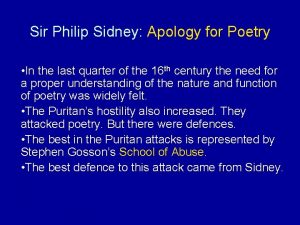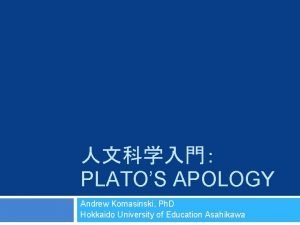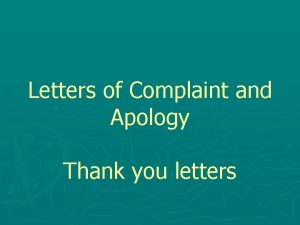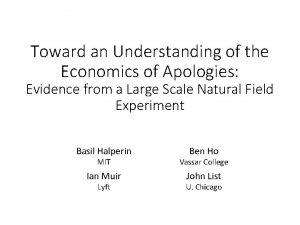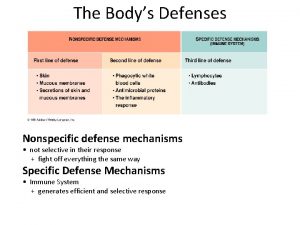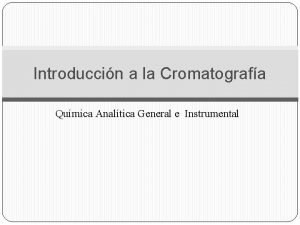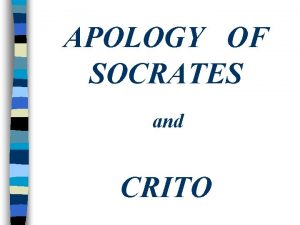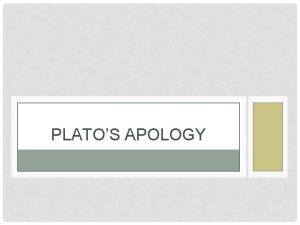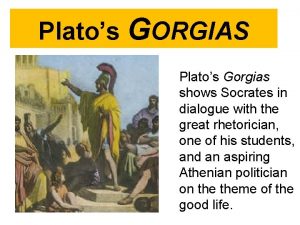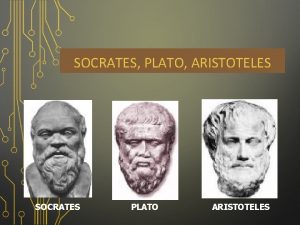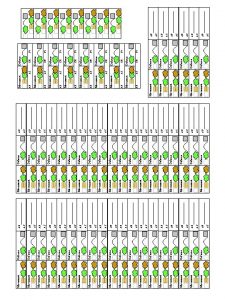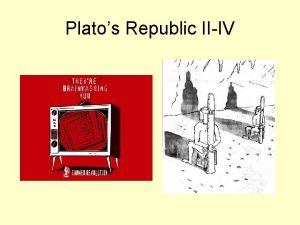Apology of Socrates Defense Speech Platos Defense of







![Final Words to “the [true] Jurors” Proclaims again that “the good man can’t be Final Words to “the [true] Jurors” Proclaims again that “the good man can’t be](https://slidetodoc.com/presentation_image_h2/b5a63d869ca548b4da6f38659149057d/image-8.jpg)


- Slides: 10

Apology of Socrates’ “Defense Speech” Plato’s Defense of Philosophy

Structure of the Dialogue n Defense (17 a-35 d) – Old charges (17 a-24 b) in which he tells of his “mission” – New charges (24 b-28 b) in which he examines Meletus – Way of life (28 b-35 d) in which he explains his values Counterpenalty (35 d-38 c) n Final words (38 e-42 b) n

Response to the “Old Charges” He does not: – “investigate things under earth or in heavens” – “make the worse argument stronger” n He is no “teacher” n Reputation for wisdom = “service to the god” n His “wisdom” = he “knows he does not know” (re: the highest things) n – vs. technical wisdom – Sophistic ‘wisdom’ – vs. divine wisdom

Response to the “New Charges” How can he be guilty of “corrupting” others when no one willingly does harm? n How can he be guilty of “atheism” if he believes in “spiritual things”? n

WHO IS SOCRATES? n Skeptic: 21 a- 23 b n Moralist: 28 b 31 b n Teacher: does not ‘instruct’

Socrates’ Way of Life Socrates “knows” he must never do wrong; must seek virtue and truth n Socrates = gadfly sent to Athens as gift from the gods n “the good man can’t be harmed” n

The Examined Life n “If I tell you that I do this as my duty to the god, you will think I am ironical. If I tell you I do this because it is the greatest good, and because the unexamined life is not worth living for a human being, you will believe me even less. ” (38 a)
![Final Words to the true Jurors Proclaims again that the good man cant be Final Words to “the [true] Jurors” Proclaims again that “the good man can’t be](https://slidetodoc.com/presentation_image_h2/b5a63d869ca548b4da6f38659149057d/image-8.jpg)
Final Words to “the [true] Jurors” Proclaims again that “the good man can’t be harmed” n Argues “death may be a blessing, if it is endless sleep, or if there is an afterlife, in which we may converse with wise and good men. ” n

Paradoxes in the Apology n n n Why doesn’t Socrates make a “better” speech (one that would get him free)? Why does Socrates think “no man willingly does wrong”(25 e)? Does Socrates “not know” the highest things (21 d), or does he “know” them (29 b-e)? Why does Socrates say “the good man can’t be harmed” (30 d, 41 d)? What does he mean? Why does Socrates say “the unexamined life is not worth living for a human being”(38 a)? Why does Socrates think “death may be a blessing”? (40 d-41 a)

Unresolved Issues n Is Socrates = a danger to the peace and security of Athens, or a godsend? n Is Socratic philosophy an enemy to the Greek religion, or religion in general, or a friend and natural companion? n Is Socrates’ serenity even in the face of death a merely personal quality, or is it somehow rooted in philosophy?
